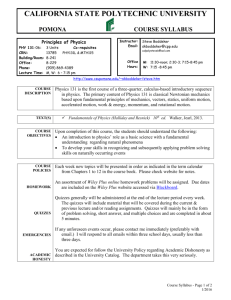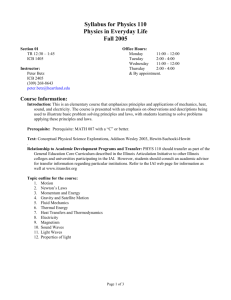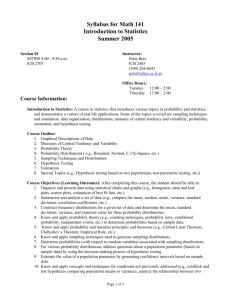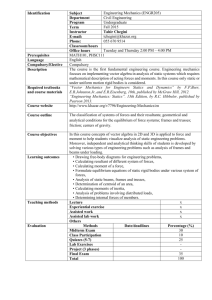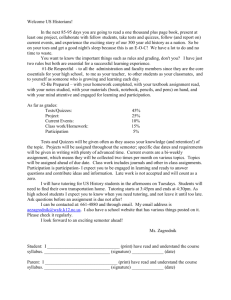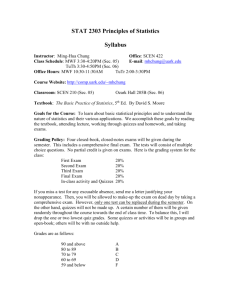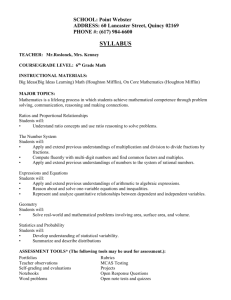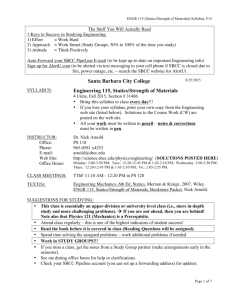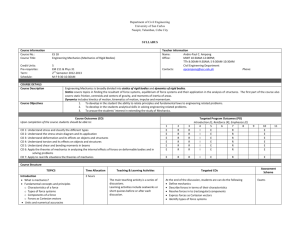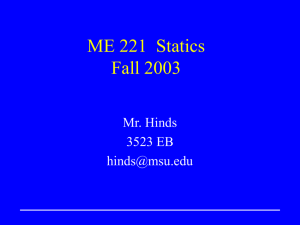Syllabus for Math 116 - Heartland Community College
advertisement
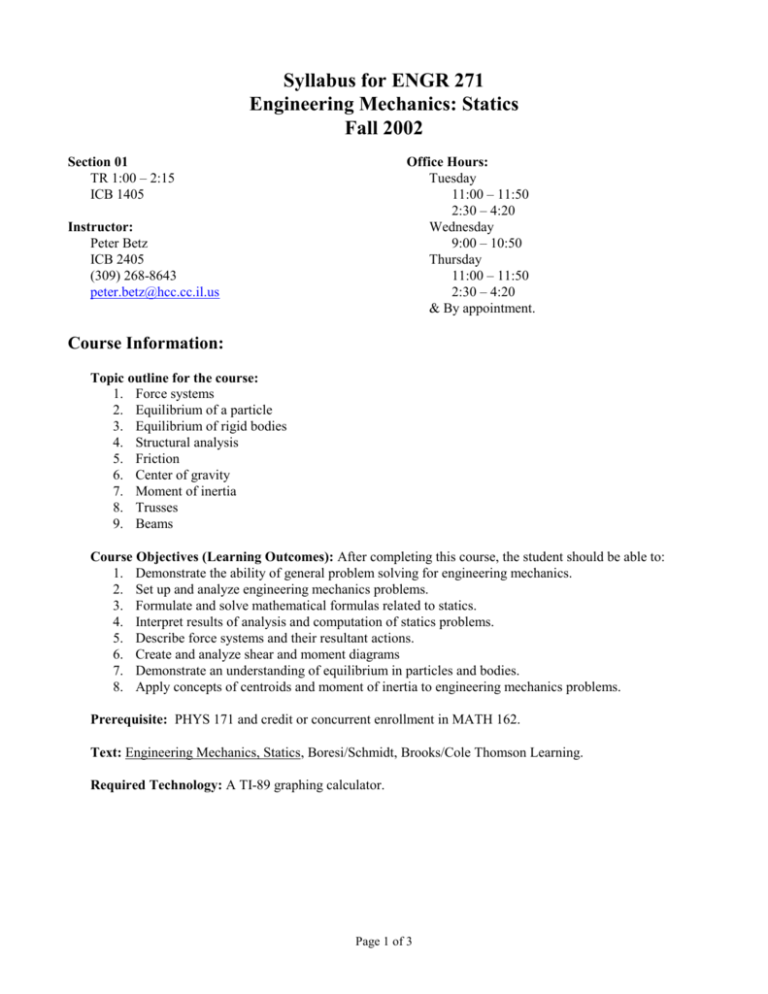
Syllabus for ENGR 271 Engineering Mechanics: Statics Fall 2002 Section 01 TR 1:00 – 2:15 ICB 1405 Office Hours: Tuesday 11:00 – 11:50 2:30 – 4:20 Wednesday 9:00 – 10:50 Thursday 11:00 – 11:50 2:30 – 4:20 & By appointment. Instructor: Peter Betz ICB 2405 (309) 268-8643 peter.betz@hcc.cc.il.us Course Information: Topic outline for the course: 1. Force systems 2. Equilibrium of a particle 3. Equilibrium of rigid bodies 4. Structural analysis 5. Friction 6. Center of gravity 7. Moment of inertia 8. Trusses 9. Beams Course Objectives (Learning Outcomes): After completing this course, the student should be able to: 1. Demonstrate the ability of general problem solving for engineering mechanics. 2. Set up and analyze engineering mechanics problems. 3. Formulate and solve mathematical formulas related to statics. 4. Interpret results of analysis and computation of statics problems. 5. Describe force systems and their resultant actions. 6. Create and analyze shear and moment diagrams 7. Demonstrate an understanding of equilibrium in particles and bodies. 8. Apply concepts of centroids and moment of inertia to engineering mechanics problems. Prerequisite: PHYS 171 and credit or concurrent enrollment in MATH 162. Text: Engineering Mechanics, Statics, Boresi/Schmidt, Brooks/Cole Thomson Learning. Required Technology: A TI-89 graphing calculator. Page 1 of 3 Syllabus for ENGR 271 Engineering Mechanics: Statics Fall 2002 Relationship to Academic Development Programs and Transfer: ENGR 271 fulfills 3 of the 7 semester hours of credit in the Life/Physical Sciences required for the A.E.S. degree. It also satisfies the laboratory requirement for the A.E.S. degree. ENGR 271 should transfer as part of the General Education Core Curriculum described in the Illinois Articulation Initiative to other Illinois colleges and universities participating in the IAI. However, students should consult an academic advisor for transfer information regarding particular institutions. Refer to the IAI web page for information as well at www.itransfer.org. Important Dates: August 28 (W) September 2 (M) October 11 (F) November 6 (W) November 27-29 (W_F) December 6 (F) Last day to drop, refund. College closed, Labor Day. College closed, Midterm break. Last day to withdraw and receive a (W) grade. College closed, Thanksgiving break. Classes end for fall semester. Grading Policy: Course grades: The grade you receive will be based on your exam scores 100 points each, class projects/quiz scores 10 points or more each, and final exam score 200 points. Note, the final is cumulative. 90% will guarantee a grade of at least A 80% will guarantee a grade of at least B 70% will guarantee a grade of at least C 60% will guarantee a grade of at least D Exams: Attendance is required at scheduled exams and the final exam. There will be no makeup exams! If your final exam percentage is higher than your lowest exam score then your lowest exam will be replaced by your final percentage. If more than one exam is missed it will be recorded as a zero. Class projects/Quizzes: You will have many projects and quizzes throughout the semester. Since your lowest quiz grades will be thrown out there will be no makeup quizzes! Types of Quizzes: Attendance: Attendance quizzes are taken at the start of class. If you are not present when your name is called you will receive a zero, even if you arrive later in the class. Homework: Homework quizzes are open notebook quizzes designed to check your progress on homework assignments. Note, these are closed textbook quizzes. Quiz: A standard quiz will be problem(s) that are similar to exam questions. Page 2 of 3 Syllabus for ENGR 271 Engineering Mechanics: Statics Fall 2002 Attendance: Regular class attendance is an important part of educational success and is expected of all students. Students who miss class are responsible for the material covered that day, including obtaining the homework assignments and lecture notes. Attendance will not be a calculated part of your grade, but you are responsible for all announcements made in class. I also reserve the right to give unannounced quizzes. Classroom restrictions: Children will not be allowed into the classroom. Food will not be allowed into the classroom. Beverages, except water, will not be allowed into the classroom. Required Writing and Reading: Students are expected to read the material in the textbook for each section studied. Required writings will be part of most assignments and exams as students explain how they found the solution, describe their solution graphically, and interpret their answer in the context of the problem. Homework: You are expected to do the assigned homework. It is expected that, at a minimum, 2 hours of outside work will be required for each hour in the classroom. This is a minimum. Some students will require more outside homework time. Also note that nothing precludes you from doing more than the required work. Extra work may be brought up by you in class or during office hours for questions and help. Incomplete grade: An incomplete grade may be given to a student who, by the withdrawal date, can reasonably be expected to pass the course. An incomplete grade may be granted only when justified by extreme circumstances (e.g., serious illness, accident, death or serious illness in the immediate family). Incomplete grades are not given for such reasons as unjustified failure to appear for the final examination. A written agreement that outlines the requirements to be met, must be signed by the instructor and the student. The agreed upon requirements must be completed no later than the end of the following semester. By the agreed upon date, the instructor will assign a grade or the incomplete will be changed to an `F’ if the requirements are not completed. Academic Integrity, Plagiarism, and Student Conduct: Syllabus Disclaimer: This syllabus is subject to change. Page 3 of 3 Please refer to the student handbook. Any changes will be announced in class.

